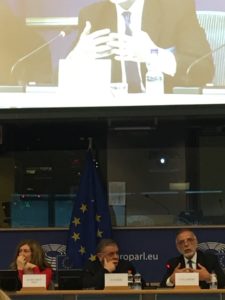On Thursday, Commissioner Iván Velásquez of the International Commission Against Impunity in Guatemala (CICIG) described for members of the European Parliament a multifaceted attack on the rule of law in Guatemala. He spoke in defense of Thelma Aldana, the former attorney general and presidential candidate charged this week with corruption. The CICIG commissioner was speaking before the Parliament’s Subcommittee on Human Rights.
Velásquez stressed that what is happening in Guatemala is not a question of personalities; it is not a battle between President Jimmy Morales and himself. Rather, the real problem is an attack on the rule of law by a group of powerful actors who have an interest in continued impunity. These include the military, senior government officials, and businesses.
Velásquez said their efforts have taken various forms beyond the government’s unilateral decision this January to end the CICIG agreement. He cited a gradual military takeover of civilian policing and a return of military symbolism, including politicians wearing military fatigues, and prominent displays of military vehicles. He said this has a huge impact in Guatemala because so many citizens were targets of the military during the 36-year conflict. He noted attacks on human rights defenders, the co-optation of judges, and threats against other judges.
As a further example, Velásquez expressed concern about this group of powerful, self-interested actors working to manipulate the electoral process ahead of Guatemala’s June 16 presidential elections. Specifically, he expressed concern over the levying of criminal charges against former Attorney General Thelma Aldana on Tuesday. The charges relate to allegations of embezzlement and tax fraud but have raised suspicion because they came on the same day that she gained approval as a presidential candidate. Aldana worked closely with CICIG on a number of anti-corruption cases during her term, most notably the La Linea case that resulted in the resignations and arrests of former President Otto Pérez Molina and Vice President Roxanna Baldetti. Today, Velásquez told the European Parliament that Aldana had been targeted precisely because of her actions to end impunity for corruption.
Velásquez praised support from the European Union and its member states, which he noted provide two-thirds of the funding for CICIG. He welcomed the March 14 European Parliament resolution on the human rights situation in Guatemala and requested that the European Union and its members take further steps to extend their support for CICIG and the rule of law in the political sphere.
Subcommittee members expressed support for CICIG and the rule of law. Some noted potential repercussions for Guatemala if attacks on the rule of law persist. MEP Molly Scott Cato said the Parliament is in a position to withdraw favorable trade terms for Guatemala. MEP José Inácio Faria specified that ongoing attacks on the rule of law call into question Guatemala’s inclusion in the EU-Central America Association Agreement. Guatemala joined that agreement in December 2013, resulting in the lifting of trade barriers. Faria added that the proposed amnesty law before Guatemala’s Congress, which would free those convicted of grave crimes and end grave crimes proceedings, cannot be accepted.

